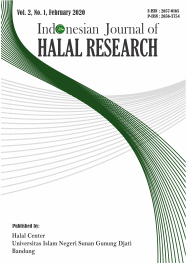The Influence of Food and Beverages in Human Life According to Buya Hamka (Analysis Study of Tafsir Al-Azhar)
DOI:
https://doi.org/10.15575/ijhar.v2i1.7704Keywords:
aklun, ghidha' un, Hamka, human, tha'amAbstract
Al-Quran is a book of life, containing various rules concerning the order of human life in the world and the results of that life in the hereafter. Therefore it is certain that the Quran talks about food. The term food in Arabic is mentioned with 3 pieces of the terms. These are: "aklun, tha'am, and ghiza 'un. But of these three terms, the Quran uses only two, namely tha'am, and aklun. This study aimed to determine the influence of food in human life by taking a few verses in Quran according to Buya Hamka's point of view in Tafsir al-azhar. Based on the results of the discussion, Buya Hamka in interpreting food verses in Tafsir al-Azhar's cannot be separated from the correlation between verses one with the other verses, so that a complete understanding of the concept of food can be obtained. Based on the verses studied, it can be understood that the meaning of food in the interpretation of Buya Hamka, is grouped into various terms, namely, healthy food, eating food proportionally according to needs, having a sense of security towards food, food as a cry, food as a warning, and food as gift. The influence of food on human life has a profound effect on a person's soul, including praying, making the soul so calm, whereas a bribe is forbidden in one's stomach, then his worship will not be accepted for forty days, bad food will damage health and soul.
References
Al-Qardhawi, Y. (1999). Berinteraksi dengan al-Quran. terj. oleh Abdul Hayyie al-Kattani, Jakarta: Gema Insani Prees.
Baidan, N. (2000). Metodologi Penafsiran al-Qur'an. Yogyakarta: Pustaka Pelajar,
Chamami, Rikza. (2002). Studi Islam Kontemporer. Semarang: Pustaka Rizki Putra.
Ensiklopedi Islam. (1993). Jakarta: PT. Ikhtiar Baru Van Hoeve.
Hamid, S. (2006). Studi Ulumul Quran. Jakarta: Intimedia Ciptanusantara,
HAMKA. (1991). Lembaga Hidup, Jakarta: Pustaka Panjimas.
_________. (1985) Tafsir al-Azhar. Jakarta: Pustaka Panjimas.
Hasan, A. (2004). Tokoh-Tokoh Masyhur Dunia Islam. Surabaya: Jawara Surabaya.
Jalal & H. A. Abdul. (1990). Urgensi Tafsir Maudu'i pada Masa Kini. Jakarta: Kalam Mulia.
Ma'luf, L. (1997) Qamus al-Munjid fi al-Lughah. Beirut: Dar al-Masyriq.
Muhammad, H et al. (2006) Tokoh-tokoh Islam yang Berpengaruh Abad 20. Jakarta: Gema Insani.
Panitia Peringatan Buku 70 Tahun Buya Prof. Dr. Hamka. (1983). Kenang-kenangan 70 Tahun Buya Hamka. Jakarta: Pustaka Panjimas.
Pius A. Partanto & M. Dahlan al-Barry. (2004). Kamus Ilmiah Populer. Surabaya: Penerbit Arkola.
Purwanto, N. (2000) Psikologi Pendidikan. Bandung: Remaja Rosdakarya.
Shabahussurur. (2008). Mengenang 100 tahun Haji Abdul Malik Karim Amrullah Hamka. Jakarta: Yayasan Pesantren Islam Al-Azhar.
Shadily, H. (2008). Ensiklopedi Umum. Yogyakarta: Kanisius.
Shihab, M. Q. (2005) Wawasan al-Quran. Bandung: Mizan.
________________. (2005). Wawasan Alquran: Tafsir Maudu'i Atas Berbagai Persoalan Umat. Bandung: Mizan.
Sugiyono. (2017). Statistika Untuk Penelitian. Bandung: Alfabeta, 2017.
Surakhmad, W. (2004). Pengantar Penelitian Ilmiah Dasar Metoda Teknik. Bandung: Tarsito.
Taimiyyah, Ibn.Al-Fatawa. (1999). Beirut: Dar al-Fikr. t. t., juz VII
Tamara, N. (1996). Hamka di Mata Hati Umat. Jakarta: Sinar Harapan.
Yusuf, Y. (2003). Corak Pemikiran Kalam Tafsir Al-Azhar. Jakarta: Pustaka Panjimas.
Downloads
Published
How to Cite
Issue
Section
Citation Check
License
Copyright (c) 2020 Indonesian Journal of Halal Research

This work is licensed under a Creative Commons Attribution-ShareAlike 4.0 International License.
Authors who publish in Indonesian Journal of Halal Research agree to the following terms:
- Authors retain copyright and grant the journal right of first publication with the work simultaneously licensed under a Creative Commons Attribution-ShareAlike 4.0 International (CC BY-SA 4.0) License that allows others to share the work with an acknowledgment of the work's authorship and initial publication in this journal.
- Authors are able to enter into separate, additional contractual arrangements for the non-exclusive distribution of the journal's published version of the work (e.g., post it to an institutional repository or publish it in a book), with an acknowledgment of its initial publication in this journal.
- Authors are permitted and encouraged to post their work online (e.g., in institutional repositories or on their website) prior to and during the submission process, as it can lead to productive exchanges, as well as earlier and greater citation of published work (See The Effect of Open Access).

Indonesian Journal of Halal Research by Halal Center UIN Sunan Gunung Djati Bandung is licensed under a Creative Commons Attribution-ShareAlike 4.0 International License.
Based on a work at https://journal.uinsgd.ac.id/index.php/ijhar.

















